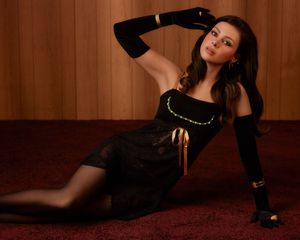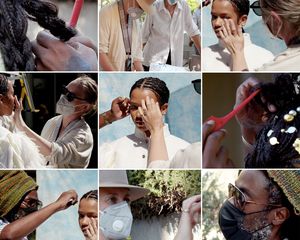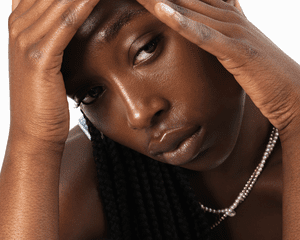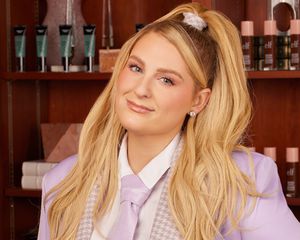“I think for a lot of my life I felt invisible,” Taylor Russell says with a self-conscious chuckle. The 26-year-old Vancouver-born actress is well aware of the irony in her reticence towards fame, given her chosen career path. “I mean, I love acting and being out there and the feeling of being on a set...It gives me so much.” She pauses, then continues slowly, “At the same time, there’s this feeling I have that if people are looking at me...it almost feels like a sort of death to some degree. I don’t know if I can handle it; it’s almost like a claustrophobia.”
We’re perched at a small patio table in the verdant bowels of Palihouse in Santa Monica, which, given the presence of a global pandemic, is eerily silent, save for our waiter, who is clearly charmed by Taylor’s presence. He seems to materialize at her elbow at exactly the right moments with a lopsided smile and offers of more caffeine and ice water. Between sips of iced coffee (with non-dairy milk to fit her plant-based diet, which she credits for improving her eczema), Taylor oscillates between a sage-like awareness of her own feelings, and then, in the space of a sigh, flashes of tender uncertainty. It is an endearingly human and vulnerable quality that feels so far beyond the shiny, chipper exterior of most celebrities (or at least the carefully-cultivated image of celebrity polish we’re so often spoon fed). In the era of social media, brand and personality can be virtually indistinguishable. The conscious desire to function in opposition of this idealized version of fame, coupled with open shows of vulnerability, is part of what makes the new generation of young actresses like Taylor so different from their forebearers.
:max_bytes(200000):strip_icc()/Taylor1-78cae995e9884223a8e1f31ac2bb3725.jpg)
:max_bytes(200000):strip_icc()/Taylor_pullquote1-2-f039a84bafef4e01b253faecb030010a.png)
As the mid-morning sun dapples the courtyard in beams of soft light, Taylor, dressed in an oversized Chicago Bulls t-shirt and loose black pants, explains that showing up as herself (and in the ways that feel right to her, and her alone) is not something worth compromising. Part of that includes setting boundaries with those she loves most. “I know what I want to keep sacred to me,” she says. “Part of what I’ve learned through therapy and the people in my life is that you create your own boundaries. And if people are going to trespass against them, it's really your responsibility to reset that boundary and to make yourself comfortable, because we can't expect anybody to know where the line is really.”
In many ways, she is already putting this belief into practice. She has very intentionally cultivated a small and tight knit community of like-minded creatives, to whom I discover she also takes on the role of resident tonic fairy. While most of us bring our friends the types of imbibements that put stress on our livers and lower inhibitions, Taylor, who doesn’t drink alcohol, has a secret passion that is more on the healing side. Almost daily, she concocts homemade herbal tonics, many of which boast numerous health, beauty and skin benefits. (After our interview, she was kind enough to send her morning matcha and coffee recipes, as well as an evening tonic. So far, I’ve tried the evening tonic—it is delicious!) By the time we get around to the finer points of how to use reishi mushroom powder, it would not be an exaggeration to say that Taylor visibly lights up, breaking into a joy-filled smile that only gets bigger and brighter as we start talking about her favorite ingestible beauty products, which include pearl powder, sea moss gel, and Moon Juice’s Collagen Protect. That Taylor has a carefully-curated holistic wellness regimen is no surprise, especially given how she approaches those she chooses to surround herself with on the outside.
:max_bytes(200000):strip_icc()/Taylor2-eadbc107a489415fb9fc5c6a7a112bca.jpg)
“I don’t have a lot of people in my life,” she says, reflecting on her close-knit support group. “In the last couple of years, I have been really protected by the people that have come into my life and it’s opened my eyes to what it feels like to be really taken care of.” She remarks on how lucky she feels that her team of agents are mostly women and “all over the sexual spectrum,” and expresses gratitude for the “really smart Black people who are my friends, but also in the industry, looking out for me.” Keeping her social circle small also allows her to hold onto the one thing she currently values above all else. “When I’m in a more peaceful state and looking at the bigger picture, I recognize that it is possible to move through the world in the way you desire and still get the result that you want, which for me, is having privacy,” she says. “I mean, the boundaries that I have now…I deleted social media for a year before this last September because I needed space in my own head to think.”
Deplatforming is probably the very opposite of what most would have done in her position, particularly after coming off of such a breakthrough. In 2018, she starred as Judy Robinson in Netflix’s Lost in Space reboot, and reappeared for the second season in December of 2019. That same year, she also co-starred in the atmospheric psychological horror offering Escape Room, and delivered a critically-acclaimed performance in one of the starring roles of A24’s much-dissected exploration of racialized suburban strife, Waves. She was awarded the Santa Barbara International Film Festival Virtuoso award for her role, a Film Independent Spirit Award, and the Gotham Independent Film award for Breakthrough Actor (past winners include Timothée Chalamet, Tessa Thompson, Michael B. Jordan and Elliot Page). More recently, she co-starred in Words on Bathroom Walls, a film that at first glance may seem like another poignant young adult love story, but probes into deeper topics like mental health and schizophrenia; critics described her portrayal of Maya Arnez as "incandescent."

Yet, as I learn over the course of our conversation, Taylor’s choices are rarely guided by what she technically should be doing, but rather by her intuition and trusting she is exactly where she’s meant to be at any given moment. It takes an impressive amount of knowledge of self, especially at her age—and even more so in an industry that has gained a reputation for making bright-eyed young hopefuls choose between their true desires and the guarantee of traditional success.
We’re back to the topic of Instagram, which Taylor reveals she reactivated recently. “I wasn’t planning on coming back, but I had a conversation with a good friend and we were talking about being young Black creators and the type of space we wanted to take up in the world,” she explains. “She posed a question to me, which was: If we had Black girls growing up that we saw who were directors or producers or actresses, or who were aspiring for the type of careers that we are in, would we have progressed sooner to our path?” This question hit Taylor hard, who immediately thought of the messages she had received from fans and followers over the years citing her work as an inspiration to their personal lives. “I’m hesitant to use that word because I don’t think of myself as this person who is inspiring people,” she says carefully. “I do want to be more comfortable with that kind of role, so that’s really part of why I got [Instagram] back. I wanted to show a way that you can enter into this arena and feel that you don’t have to compromise parts of you, or show too much of the private parts of your life.”
Taylor’s own entrance into acting was equal parts serendipity and nebulous, half-formed intention. Growing up with a father who was a working actor exposed her to the possibility that she too could embark on a similar path, but it hardly seemed realistic for most of her adolescence. “I actually thought I was going to be a painter,” she confesses with a soft, tinkling laugh. She briefly flirted with the idea of auditioning for acting roles around the age of 12, but with two parents who had full-time careers and other kids to tend to, they couldn’t always be there to supervise on sets or accompany her to auditions. As a compromise, the family agreed that when she got a bit older, if she was still interested, she could forge ahead on her own.

But her first encounter with acting almost deterred her from it entirely. “I actually took an acting class when I was in grade nine, but my teacher really didn’t inspire me,” she remembers. “I felt stifled by her and put in a box—like if I wasn’t the way she wanted me to be or if I didn’t play by her rules, I couldn’t be an actor. That sort of teaching has never worked for me.” It wasn’t until after her graduation that she seriously entertained the thought of acting again. Between working odd jobs (something she tells me conspiratorially she’d done since age 14, when she padded her age by two years to get a waitressing gig), she signed up for another acting class; this time, it stuck.
Learning to navigate in an industry rife with competition, particularly for Black talent and women (who, even in the midst of the moment’s race and gender reckoning, often still contend with pay discrepancies and more limited opportunities than their peers) proved to be her next challenge. “When I was coming up, a lot of my experiences with people felt very, um, like, hawk eye, you know? Like clocking,” she recalls. “And I didn’t understand that because I have never been a competitive person. Karmically and spiritually, I really feel [what’s meant for you] will never pass you. What is meant to stick will stick. Why would I fight with somebody when I know that I'm going to get what I will be given?”
:max_bytes(200000):strip_icc()/Taylor4-54a2516ceb8441d4b04bfdd92d26a26f.jpg)
She goes slightly misty-eyed as she continues. “I never thought I would have a close friend in this industry—I have maybe three close friends—but one of my closest friends is an actress,” she says with a smile. “It’s been really beautiful for me to define a friend in this industry, a friendship where we can both truly celebrate each other. We're so different and I can love on her, she can love on me, and we can collaborate. There’s no weirdness.” The depth and sincerity in her voice is heartwarming, and achingly genuine; it’s in these little moments the true dichotomy of her public and personal life reveals itself. For Taylor, friendship could never be surface level fluff, or gossip fodder to be analyzed by the media. Rather, it’s yet another sacred part of her quiet, private life—one that represents safety, kindness and an unconditional love reflective of the rarest sort of intimacy.

In 2020, Taylor collaborated with another close friend, Savanah Leaf, to make her directorial, producing and writing debut in a short documentary titled The Heart Still Hums, which follows six young mothers and mothers-to-be who are navigating issues ranging from addiction to homelessness. Having grown up with foster siblings for part of her life, the project felt particularly poignant and close to her heart. The 28-minute offering, which won The Palm Springs International Short Fest, was also inspired by their mutual understanding of the infrastructures and networks in place in underprivileged communities. The weight of the subject matter and the opportunity to humanize a crisis that is often overlooked is what drew Taylor in. Interfacing with the women featured in the project only cemented her determination to continue finding and directing projects that have an emphasis on drawing needed attention to issues that uniquely impact women as her next career move. “I’ve always wanted to direct—I think I was just really nervous because I didn’t go to film school or acting school,” Taylor says. “But I’ve been on set and seen the way things work, and I’ll think, ‘What about if we tried it this way? Or what if we did this instead?’” Her inherent curiosity and hunger for knowledge drew her naturally to the research part of the process, which she compares to “a groundhog digging itself into a hole and then being able to pop up and make decisions.” Ironically, it’s being behind the camera that makes her feel most exposed. “It’s like, suddenly people see you and your thought process and there’s so much fear that comes with that,” she remarks. “I really thrive in that fear with directing and producing. That’s how directing makes me feel—like you’re throwing in potions like a witch, and then you’re stirring it up and seeing what comes out.”
:max_bytes(200000):strip_icc()/Taylor5-874670bb97be4dd88d3a94f00dc44808.jpg)
It is perhaps these juxtapositions—thriving off of the fear of exposure while also holding onto the desire to be completely invisible—that make the very private Taylor Russell feel simultaneously so open and relatable. We’ve all felt that same rush of emotion when we’ve been suddenly nudged into the spotlight—half dread and half elation, but more than that, an inexplicable desire, something akin to a sugar rush or a burst of adrenaline, that calls on us to be seen as we are without having to apply the trappings of social grace. It is in this space—the space of simply being present as herself—that Taylor seems most at peace. It makes one wonder if perhaps the biggest role of her lifetime could be to simply teach others that honoring your intricacies and imperfections is more precious than any level of fame can bring.
“This man came up to me the other day when I was doing this junket and he was like, ‘I feel like in your body of work, now that I am watching you, I feel like you can do anything,’” Taylor recalls. “And it made me tear up because I was like, ‘Oh my gosh, somebody else views me that way.’ Like, I couldn't even handle that. I couldn't even comprehend that somebody could view me in the way that I view myself on a good day. You know?”
Yes, we really do.
Photographer: Daria Kobayashi Ritch / Jones MGMT
Makeup: Kate Lee using CHANEL Baume Essentiel / The Wall Group
Hair: Johnnie Sapong / The Wall Group
Braids: Noelle Ward-Wallace
Stylist: Mindy Le Brock / The Magnet Agency
Nails: Michelle Wilson
Creative Direction: Hillary Comstock
Beauty Direction: Faith Xue
Video: WesFilms
Casting: Cortney Pellettieri and Ali Forman/ Talent Connect Group
:max_bytes(150000):strip_icc()/landingpage_hero-6ed3783af8f74853aa27a008a4dd3937.jpg)
:max_bytes(150000):strip_icc()/cover-RECIRC-5b7ea359fc4d4a67989d63520f5725c4.jpg)
:max_bytes(150000):strip_icc()/Landing-Page-Collage-4ce33fe4697e486c984b7c8b3cca0926.jpg)
:max_bytes(150000):strip_icc()/Star-Recirc-EDIT2-33bbdcda4650405195128a016ae88c8b.jpg)
:max_bytes(150000):strip_icc()/NEW-option-Fall-Editor-Picks1-6ea06228420245aca1149a92f94e817a.jpg)
:max_bytes(150000):strip_icc()/MASKTIVISM-RECIRC-PleaseWearMask-9164bd44df08469dbf654d865f79028b.jpg)
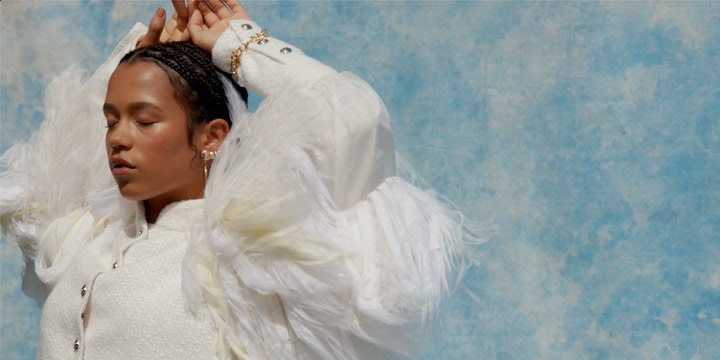
:max_bytes(150000):strip_icc()/Taylor-3_pullquote-21-0655f8dbacbf4515bf6834fc412d1d52.jpg)
